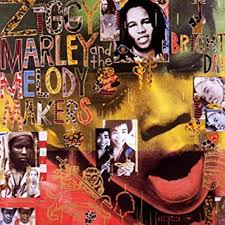 By Jae-Ha Kim
By Jae-Ha Kim
Chicago Sun-Times
September 3, 1989
Ziggy Marley is a young man of few words. He prefers that people get his message through his music.
“I have nothing to say that I think is more important than the music I make,” said Marley. “It seems useless to me that I talk so much about myself. In the long run, how important is that? A quote is a quote. Music is forever.”
But people want to know about Marley, the 20-year-old son of the late reggae great Bob Marley. Besides bearing a striking physical resemblance to his father, Marley shares his rich voice and direct songwriting style.
Marley and the Melody Makers will perform cuts from their latest album, “One Bright Day,” on Thursday at Poplar Creek Music Theatre in northwest suburban Hoffman Estates. A group of Chicago-based Ethiopian musicians called Dallol will perform backup for Marley and the Melody Makers.
Although Marley’s youthfulness and don’t-give-a-damn attitude sometimes make him seem sloppy onstage, his passion for his music wins over audiences.
The Melody Makers, including Marley’s brother Stephen, 16, and sisters Sharon, 23, and Cedella, 21, travel well together because they share this passion.
“We all get along fine, or we couldn’t travel together like this for so long,” he said in a thick Jamaican accent. “We know what gets on each others’ nerves and try not to do it to each other. But we do have little squabbles just like every other brother and sister.
“The girls tend to fight over things like clothes. Stephen and I don’t care much about things like that. One thing we almost always agree on is our music. We’re all passionate about that.”
“One Bright Day” is a strong followup to last year’s best-selling “Conscious Party.” As with that record, “One Bright Day” is rich with snippets of Marley’s history.
“Reggae music encompasses everything,” he said in a telephone conversation from New York. “It’s not just about one style of music or a way of singing. It comes from the heart, and the things I sing about mean a lot to me.”
For instance, Marley wrote “Black My Story (Not History)” after being fed up with accounts of black history in school textbooks. “When I was in school, and in the classes my brother Stephen takes, the teachers taught us about slaves, but not about what our ancestors in Africa did,” Marley said. “That’s telling all the children only the bad things we endured. What kind of an example is that?
“If you want to motivate young people and give them hope, you have to let them know what we’re capable of doing, and you learn that by reading what people before us did.”
Carrying on the reggae tradition his father made so famous is not as big a burden as one might think, Marley said. Although many celebrity offspring have failed to live up to the family name, Ziggy is confident he will succeed at making music because it’s in his blood.
“I grew up hearing my dad’s beautiful music when I was a child, and just hearing him play and sing made me learn about music,” he said. “Reggae is a simple music in the sense that you don’t have to be a classically trained genius. It’s music that’s filled by life’s experiences. I have a life. I have experiences. I sing about them. And it works.
“I’m not concerned about gaining the type of popularity my father had. I just want to be respected for doing what I do well. So far, I think my brother and sisters and I have done something with ourselves to be proud of.”
The Marley family hasn’t isolated itself from the world or limited itself to music. Stephen is continuing his education, while Sharon and Cedella are fledgling actresses, having appeared in the film “The Mighty Quinn.” And Ziggy has produced local Jamaican bands under the Ghetto United Label in his hometown of Kingston.
“I don’t have any plan that I am following to keep me on course,” he said. “I work hard at what I do because I love it, and it means a lot to me. In the future, who knows?
“I will stop making music when it stops meaning something to me. I’m not interested in making history with my music. For now, I’m happy being a musician.”